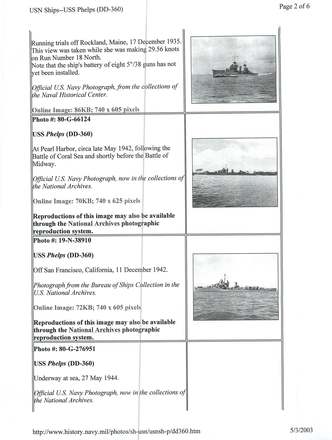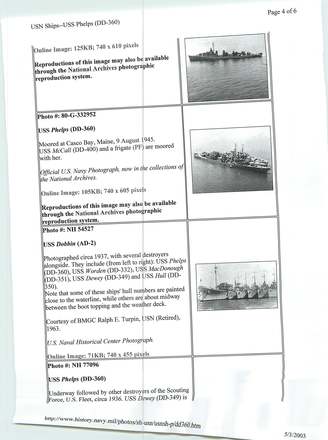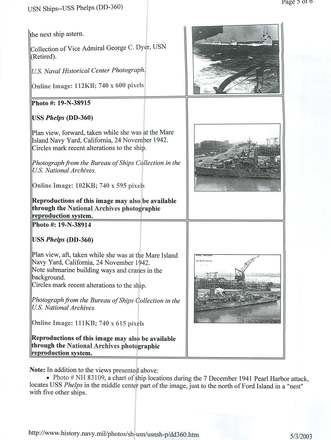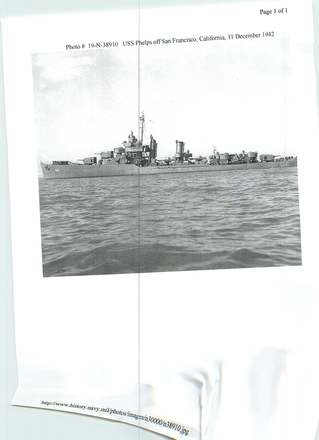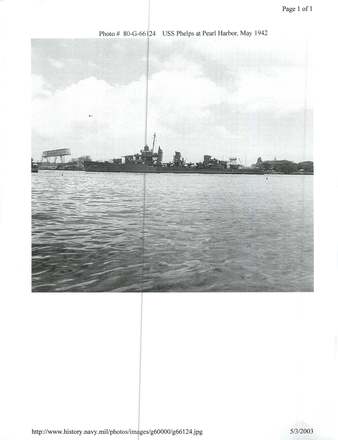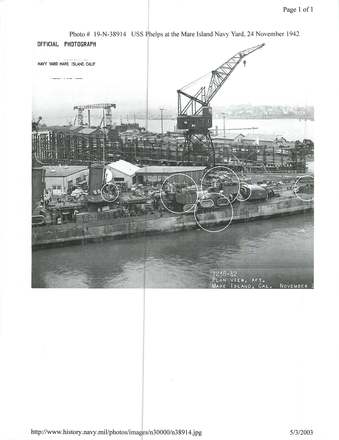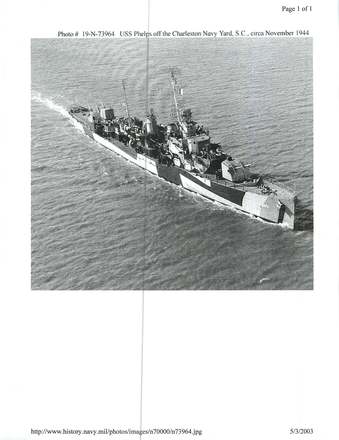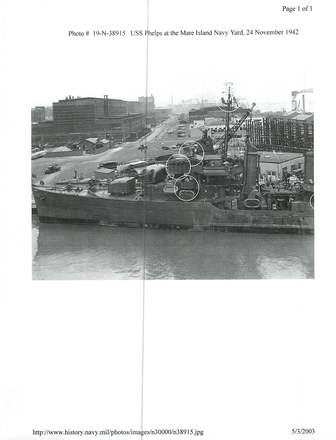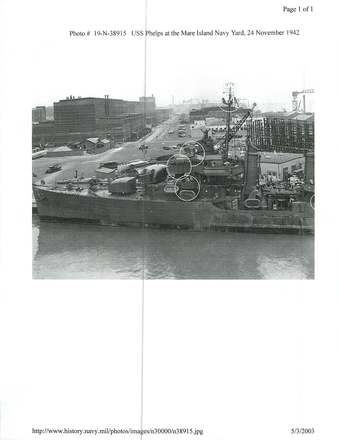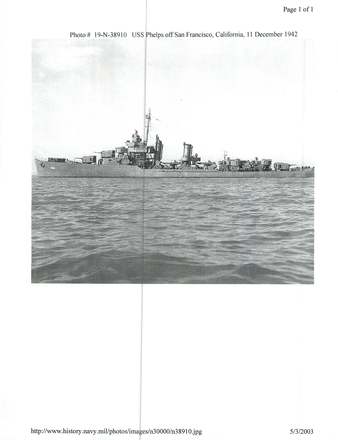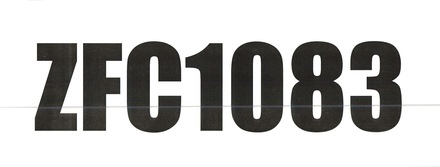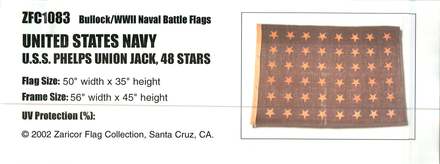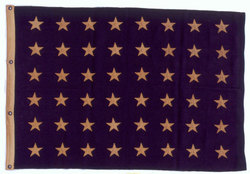

Obverse

Kimmins

Bullock Forum
U.S. 48 stars Union Jack - U.S.S. Phelps.
Sub-collection: Bullock // WWII Naval Battle FlagU.S.S. Phelps, 48 Star U.S. Jack, 1st U.S. Flag hoisted over Japanese Home Territory WWII, Feb. 1944
The Destroyer, U.S.S. Phelps was in Pearl Harbor, Hawaii when the Japanese attacked on December 7th, 1841. During the ensuing engagement, the Phelps was credited with downing at least one Japanese plane and with assisting in the destruction of three others. After the battle, the U.S.S. Phelps was sent to San Francisco for refitting, and while there it received this forty-eight star "jack" flag that had been produced at Mare Island Naval Depot in November of 1942. On 31 January 1944, the U.S.S. Phelps was the first United States warship to drop anchor in Japanese "home" waters during World War II. This occurred at Kwajalein Island in January of 1944. Upon dropping anchor in the harbor of Kwajalein, this "jack" (symbolizing the reuniting of the ship with "mother earth") was raised at the ship's bow, in accordance with navy traditions.
A significant 48 star flag in the Bullock Collection; and according to the Bullock documentation this flag hung in the "Lecture Room:"..."From left to right-from podium" in Calvin Bullock's offices at No. 1 Wall Street, NY. This flag was the 5th from the left. Bullock's document states, "Flew on the U.S.S. Phelps - first American Warship to drop anchor in Japanese waters World War II. At Kwajalein (Jan. & Feb. 1944)." Markings on the flag show it was issued by the US Navy at Mare Island Nov. 1942. The Union Jack flew on the Bow of US Warships.
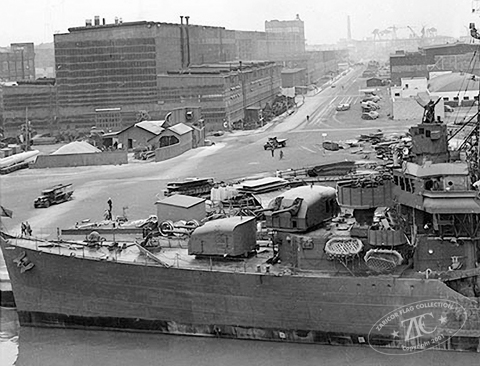
Flag shown flying on the U.S.S. Phelps at the Mare Island Navy Yard, CA, 1942 is possibly the one shown here which the Phelps acquired during this refit.
R.N.Commander Anthony Kimmins relates the story of this flag in his 1947 book titled "Half-Time" on his exploits in WWII. "As I said in the broadcast, the Phelps was the first U.S. warship to anchor in a Jap harbour during the war. Both U.S. and British Navies follow the same custom of only flying their ensigns at sea, and hoisting the Jack at the staff in the bows as the ship anchors, makes fast to a bouy, comes alsongside, or in any other way becomes re-attached to Mother Earth. In other words, Phelps let go her anchor in the lagoon, the equivalent of our Jack-the American blue flag with its white stars-was hoisted, the first to be hoisted in a Jap harbour. When I came to leave the ship, they presented me with the flag as a souvenir. It was about the most treasured gift I have ever received, and later, on my third appearance at the Calvin Bullock Forum in New York, I loaned it to Mr. Bullock for his collection of his historic flags." I am proud to think that it hangs in such an honoured position in the United States."
Besides being the first U.S. warship to drop anchor in Japanese waters it was also present at Pearl Harbour on the morning of December 7, 1941 where it was credited with downing at least one Japanese airplane and assisted in the destruction of three other enemy planes.
Exhibition History
Calvin Bullock Forum Conference Room
1 Wall St.
New York, New York
First Presidio Exhibit
(ZFC1083)
United States Navy Jack Of The U.S.S. Phelps
Second Presidio Exhibit, 2003 - GALLERY VI
(ZFC1083)
United States Navy Jack U.S.S. Phelps
Publication History:
Bullock, Hugh, Sixty Years, Calvin Bullock, New York, 1954.P.32.
Madaus, Howard M., Dr, Whitney Smith, The American Flag: Two Centuries of Concord and Conflict. Santa Cruz: VZ Publications, 2006, p. 124.
ZFC Significant Flag
Item is Framed
Provenance:
• US 48 star jack made at Mare Island Naval Ship Yard, 1942.
• USS Phelps, 1942/44.
• Presented to Royal Navy Commander Anthony Kimmins bu USS Phelps at Kwajalein Atoll, Marshall Islands, 1944.
• Gifted to Calvin Bullock, New York, NY, until passing, 1944.
• By bequest to Hugh Bullock, until passing. 1966.
• By descent in Bullock family to daughter of Hugh Bullock, until 1997
• Acquired by the Zaricor Flag Collection via private treaty from estate Calvin Bullock of New York City, 1997.
Sources:
Madaus, Howard M.- Whitney Smith, The American Flag: Two Centuries of Concord and Conflict, VZ Publications, Santa Cruz, 2006.
Bullock, Hugh, Sixty Years, Calvin Bullock, New York, 1954.P.32.
Kimmins, Anthony, Half-Time: The Autobiography of Captain Anthony Kimmins, London, William Heinemann Ltd., 1947.
USS Phelps, Wikipedia, 14 November 2011, from:
http://en.wikipedia.org/wiki/USS_Phelps_%28DD-360%29
USS Phelps, Report of Pearl Harbor Attack, Pearl Harbor Action Reports, 7 Dec 1941, 14 November 2011, from:
http://www.history.navy.mil/faqs/faq66-4.htm
Battle of Kwajalein, 14 November 2011, from:
http://en.wikipedia.org/wiki/Battle_of_Kwajalein
Image Credits:
Zaricor Flag Collection
xyz
Hoist & Fly | |
|---|---|
| Width of Hoist | 50 |
| Length of Fly | 35 |
Stars | |
|---|---|
| Size of Stars | 3 |
Stripes | |
|---|---|
| Size of Hoist | 1.75 |
Frame | |
|---|---|
| Is it framed? | yes |
| Frame Height | 45 |
| Frame Length | 56 |
Stars | |
|---|---|
| Number of Stars | 48 |
| How are the stars embeded? | Sewn |
| Are there stars on obverse? | yes |
| Are there stars on reverse? | yes |
Stripes | |
|---|---|
| Color of Top Stripe | Red |
| Color of Bottom Stripe | Red |
| Has a Blood Stripe? | no |
Nationality | |
|---|---|
| Nation Represented | United States |
Fabric | |
|---|---|
| Fabric | Wool |
| Comments on Fabric | Bunting |
Stitching | |
|---|---|
| Stitching | Machine |
Thread | |
|---|---|
| Thread Material | Cotton |
Attachment | |
|---|---|
| Method of Attachment | Grommets |
Condition | |
|---|---|
| Condition | Good |
| Damage | Soiled overall |
| Displayable | yes |
Exhibits | |
|---|---|
| Exhibition Copy | First Presidio Exhibit (ZFC1083) UNITED STATES NAVY "JACK" OF THE U.S.S. PHELPS Date: 1942-1947 Media: Wool bunting and cotton; machine sewn Comment: The Destroyer, U.S.S. Phelps was in Pearl Harbor, Hawaii when the Japanese attacked on December 7th, 1841. During the ensuing engagement, the Phelps was credited with downing at least one Japanese plane and with assisting in the destruction of three others. After the battle, the U.S.S. Phelps was sent to San Francisco for refitting, and while there it received this forty-eight star "jack" flag that had been produced at Mare Island Naval Depot in November of 1942. The U.S.S. Phelps was the first United States warship to drop anchor in Japanese "home" waters during World War II. This occurred at Kwajalein Island in January of 1944. Upon dropping anchor in the harbor of Kwajalein, this "jack" (symbolizing the reuniting of the ship with "mother earth") was raised at the ship's bow, in accordance with navy traditions. Provenance: Acquired by the Zaricor Flag Collection (ZFC1083) in 1997 from the collection of the late Calvin Bullock of New York City. Acquired by Mr. Bullock from Royal Navy Commander Anthony Kimmins in 1944. Second Presidio Exhibit, 2003 - GALLERY VI (ZFC1083) United States Navy Jack U.S.S. Phelps Date: 1942-1947 48 Stars: July 4, 1912-July 3, 1959 (statehood: New Mexico January 6, 1912; Arizona February 14, 1912) Media: Wool bunting and cotton; machine-sewn Comment: The destroyer U.S.S. Phelps was in Pearl Harbor, Hawaii, when the Japanese attacked on December 7, 1941. During the ensuing engagement, the Phelps was credited with downing at least one Japanese plane and with assisting in the destruction of three others. After the battle, the U.S.S. Phelps was sent to San Francisco for refitting and, while there, it received this 48-star jack that had been produced at the Mare Island Naval Depot in November 1942. The U.S.S. Phelps was the first United States warship to drop anchor in Japanese home waters during World War II. This occurred at Kwajalein Island in January 1944. Upon entering the harbor at Kwajalein, this jack was raised at the ship's bow, symbolizing the reuniting of the ship with "Mother Earth," in accordance with Navy traditions. Provenance: Acquired by the Zaricor Flag Collection (ZFC1083) in 1997 from the collection of the late Calvin Bullock of New York City. Acquired by Mr. Bullock from Royal Navy Commander Anthony Kimmins in 1944. The exhibition text was written by Howard Michael Madaus, Exhibition Director of the ZFC's Flag Center, utilizing Zaricor Flag Collection archives |
| Exhibition Images | |
Publications | |
|---|---|
| Biography | |


